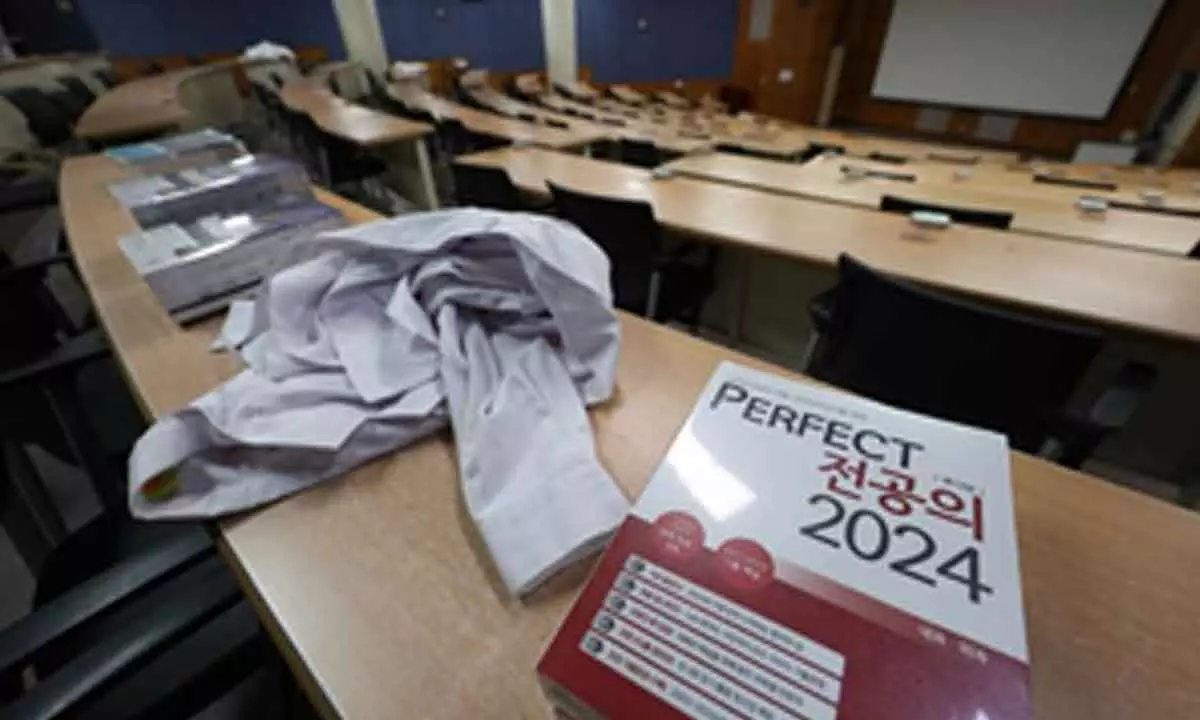Live
- Damodar tells docs to discharge patients only after complete recovery
- Toddy tragedy: Balanagar excise inspector suspended
- OU announces restricted entry for CJI’s lecture today
- Activist files PIL in HC to restrain govt from relocating OGH to Goshamahal
- Apologise for abetting those behind Rohith Vemula’s death: Bhatti to BJP
- Sridhar Babu bats for eco-friendly construction practices
- Ponnam lays foundation stones for devpt projects in Jubilee Hills
- TGCHE announces admission schedules for EdCET-2025 & PECET-2025
- Five arrested in murder case
- Russia pounds Ukraine's second largest city with drone barrage

Doctors and medical school professors took a cautious stance on Friday regarding the presidential office's possible revision to the medical school admissions hike plan, stressing that it needs to revise the plan not just for 2026 but for next year.
Seoul : Doctors and medical school professors took a cautious stance on Friday regarding the presidential office's possible revision to the medical school admissions hike plan, stressing that it needs to revise the plan not just for 2026 but for next year.
Earlier in the day, the presidential office said that it is open to revisiting the plan to drastically increase the quota starting next year "if the medical community presents a reasonable suggestion", Yonhap news agency reported.
The ruling People Power Party (PPP) also said that both the PPP and the government are willing to discuss the medical reform issue from scratch and on the table would be the potential adjustment of the admissions for 2026.
As part of the medical system reform, the Yeon Suk Yeol administration has vowed to increase the medical school admissions quota by 2,000 seats per year over the next five years or so to address a shortage of doctors, and it finalised a hike of some 1,500 students for next year.
The plan prompted trainee doctors nationwide to leave their workplaces in February, crippling the medical system.
Despite fierce opposition by doctors, the government has said the quota hike plan cannot be revoked.
"There has not been any official suggestion regarding the formation of a joint consultative body, and we are not able to say whether to join that or not," an official of the Korean Medical Association (KMA) said.
"Key to resolving the situation is discussing the possible revision of the quota hike plan for next year first, not for 2026," the official added.
PPP leader Han Dong-hoon proposed establishing a joint consultative body involving the rival parties, the government and the medical community to address the ongoing shortage of medical services and to improve the regional and essential healthcare systems.
An official of the National Medical Professors' council also made it clear that junior doctors and medical school students are unlikely to return unless the government changes its decision about the 2025 quota.
Doctors claim that medical schools will not be able to handle the increased enrollment, which will compromise the quality of medical education and ultimately the country's medical services.
The monthslong standoff has put a strain on the country's medical system, prompting major hospitals to cut back on surgeries, outpatient treatment services, and emergency room operations.

© 2025 Hyderabad Media House Limited/The Hans India. All rights reserved. Powered by hocalwire.com






